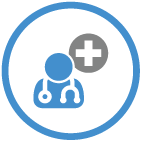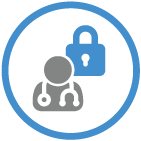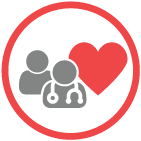Overview
You’ll learn about the partners involved in Alberta healthcare. You’ll also find answers to questions like:
- How are you a partner in your health care?
- How is the Government of Alberta involved?
- Who makes the rules and decisions?
- Who does what?
|
Healthcare partners work together to meet the healthcare needs of Albertans. The most important partner in healthcare is
you. After all, healthcare is all about the people who need it. Without people, there wouldn’t be a need for healthcare.
So where do you fit in?
You are at the centre of care of the
healthcare system at all stages of your life, including when you’re healthy, working to stay healthy, or at the end of life.
At any stage, you’ll use the health system in some way. This is why it’s important to know:
- how to
advocate for yourself and your loved ones
- your rights as a partner in healthcare
Select a partner below to learn more.

You and your family
You are the most important partner in your healthcare. No one can understand what your healthcare needs are without
you.
Your questions, how you describe how you feel, and other information you share with your healthcare providers is most important. What you share helps you and your healthcare partners work together to decide your care and how they can best help you.
Your family and others close to you are an important part of your health too. They’re the ones who support you. Family includes your family members, guardians, friends, and other people in your life that give you support and care.
Your family can also go with you to your health-related appointments. Having someone with you can help you remember details and share important information about your health. You can choose whether or not you want someone to go with you to your appointments.
Learn about
other partners.

Government partners

rights
|

writing policy
|

ensuring quality
|

delivering healthcare services
|
Government partners use money from taxes to pay for (fund) healthcare, develop healthcare policies, and set
standards for healthcare.
Alberta Health
Alberta Health is the Government of Alberta department that’s responsible for the healthcare system in Alberta. It oversees:
- health laws, regulations, rules, and bylaws
- health funding
- the Alberta Health Care Insurance Plan
The Alberta Health Care Insurance Plan tells you what health services are paid for by the Government of Alberta. Your Alberta Personal Health Card lets your healthcare providers know that you belong to this plan.
Find out more about
Alberta Health.
Alberta Health Services
Alberta Health Services (AHS) delivers healthcare services to Albertans on behalf of the Government of Alberta. AHS is the biggest healthcare provider in the province and in all of Canada.
AHS works with other healthcare partners to make sure Albertans get the care they need. When you need surgery, visit an emergency department, or need treatment for cancer, a healthcare team at AHS will likely care for you.
Learn more about Alberta Health Services.
-
Advisors and Advisory Councils
AHS teams and departments work with volunteer patient and family advisors, as well as
Health Advisory Councils, on projects, procedures, and documents.
Learn more about
why AHS engages with patients and their families.
-
AHS partners
AHS has a contract and relationship with Covenant Health, a Catholic organization that offers many health services to Albertans. AHS is also connected to Alberta Precision Laboratories, Carewest and Capital Care Group. AHS and these organizations benefit from sharing the cost of resources they all need.
Health Quality Council of Alberta
The Health Quality Council of Alberta (HQCA) looks at how well the healthcare system is working. It works with our government, healthcare providers, and other partners to make healthcare in Alberta better and safer.
Find out more about the
HQCA.
Office of the Alberta Health Advocates
The Office of the Alberta Health Advocates gives information about the Alberta Health Charter and patients’ rights. The Alberta Health Charter outlines the principles of our health system and what Albertans can expect from healthcare.
Alberta Health Advocates:
- help you learn about your rights
- connect you to the services, programs, and resources that you’re looking for or need
- help you find someone to listen to your complaints or concerns about your healthcare
- offer ways to help you solve an issue or find someone who can help you
- can share ways to help you communicate with your health providers
Find out more about the
Office of the Alberta Health Advocates and the
Alberta Health Charter.
Your health information
Government partners work together to give Albertans safe, high-quality healthcare. Only care providers who directly care for you need to have access to your health information.
Your privacy is important. Your healthcare providers don’t share information about your health with other providers unless they need to or you’ve asked them to. That’s why it’s important your healthcare provider has the information they need to know about your health.
Learn about
other partners.

Publicly funded partners
|

funding from tax dollars

medical clinics
|
Some publicly funded partners care for you and your family, but aren’t part of Alberta Health Services. These include most family doctors, medical clinics, and centres that care for older adults.
In most cases, if you’re asked to show your Alberta Personal Health Card, it’s because this healthcare is publicly funded. This means the Government of Alberta pays for this care using your tax dollars.
There are other services that you’ll have to pay for that aren’t publicly funded. To find out what services are paid for and which ones aren’t, go to
Alberta Health.
Learn about
other partners.

Privately funded partners
|

private health insurance
|
Privately funded partners care for you and your family. These partners aren’t connected to the government or Alberta Health Services. They offer health services that aren’t paid for by the Alberta Health Care Insurance Plan.
These partners may ask you to show your Alberta Personal Health Card, but that doesn’t mean the health service will be all or partly paid through the Alberta Health Care Insurance Plan.
Privately funded partner services include:
- dental care
- prescriptions
- eye care
- nutrition
- physical fitness
- well-being
If you have private health insurance (like Alberta Blue Cross), it may cover the cost of some of these services. You may have private health insurance through a
workplace plan or one you buy yourself.
Privately funded partners sometimes arrange for the cost of the service to be paid directly to them through your private insurance. Or you may have to pay for the service at the time of your appointment.
If you’ve paid for the service and the cost is covered through your insurance plan, you can then put in a claim for this cost and the insurance company will pay you back (called a reimbursement).
If you don’t have private health insurance, you need to pay for the service.
Learn about
other partners.

Education and research partners
|

training future professionals

research
|
Education partners are an important part of Alberta’s health system. They teach and train our future
healthcare professionals to work in healthcare. They also offer opportunities for current health professionals to keep learning.
Education partners do research that makes healthcare better, by finding new ways to treat and care for different diseases and illnesses.
- Universities, colleges, and other post-secondary institutions in Alberta participate in health-focused research and training.
The University of Alberta is an example of an education partner. This university developed the
Edmonton Protocol that has changed the lives of hundreds of people with diabetes.
- The
Alberta Strategy for Patient-Oriented Research (SPOR) is an education partner that improves patient care through research. SPOR has a
Patient Engagement Platform that connects and provides support to patient partners, researchers, and community organizations to help them work together on health research.
Learn about
other partners.

Not-for-profit partners
|

help for the community
|
Not-for-profit partners play an important role in healthcare. They help to fill gaps that aren’t covered by other healthcare partners or your taxes.
There are many not-for-profit partners in Alberta and Canada that offer services or raise money for research. Some of these partners include:
- Alberta Alzheimer’s Society
- Alberta Cancer Foundation
- Ronald McDonald House Charities
- Crohn’s and Colitis Canada
- Canadian Mental Health Association
Some not-for-profit partners, like hospital trusts and foundations, raise money for research, buildings, and equipment.
Learn about
other partners.

Professional Partners
|

practice permits & licences

professional regulations
|
Professional partners are colleges and associations that:
- regulate health professions in Alberta
- set standards of practice
- give out practice permits and licences to healthcare professionals, such as doctors, nurses, physiotherapists, occupational therapists,speech-language pathologists, and pharmacists
- offer continuing education courses that healthcare professionals need to stay up to date in the work they do
- are a community of health professionals with similar interests and expertise
A professional college protects the general public. A professional association protects and promotes their members. Some professional partners are organizations that combine both of these roles.
Professionals who belong to these colleges and associations pay membership fees to have a practice permit or licence to give healthcare. Health professionals that work for healthcare organizations, like Alberta Health Services, need a current licence or practice permit to give healthcare.
Learn about
other partners.
